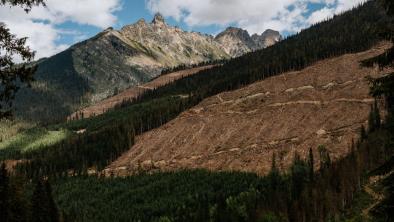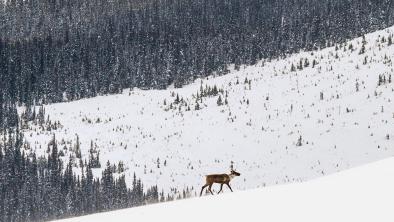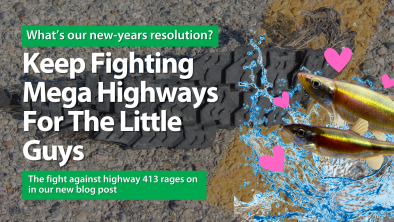Premier Clark's Report Card - Shared Vision
Sunday, June 14, 1998

June 15th, 1998
By Joe Foy
Can you remember back to the days when you got report cards? I can. The anticipation leading up to the big day, the long walk home, the family conversation and the plans for improving marks for the next report card are all vivid memories of my childhood. Report cards were and still are a big deal in many families across Canada.
World Wildlife Fund (WWF) issues a report card every year to each of the ten provincial governments and the federal government grading their progress in park protection. This report card is a big deal too.
When this year's grade for B.C. was announced by WWF in April, B.C. conservationists were horrified to discover that the Clark government had been awarded a C+ -- a respectable passing mark -- for B.C.'s 1997 conservation efforts. It was, we surmise, WWF's way of rewarding the Clark government for the preservation of one million hectares in the Northern Rockies as provincial parkland. While lauding this establishment of a new large northern provincial park, we (Western Canada Wilderness Committee, Canada's largest membership based conservation group) were adamantly opposed to giving Clark a passing grade and even went so far as to issue our own grade -- an F -- for Clark's poor enviro-performance across the rest of the province.
So why is the environmental report card such a big deal, and why do conservation groups disagree so widely on grading?
The big reason is that governments use the grade (if it's a passing grade) to justify and legitimize their conservation policies. This is especially important to the government of B.C., which pumps many tens of millions of dollars annually into an advertising campaign aimed at domestic and foreign buyers of B.C. wood products. The government's P.R. campaign is designed to quell the buyer's distaste for environmental damage caused by B.C. logging operations.
A respectable passing grade by WWF, one of the world's most well known conservation organizations, is like a gift from the gods to the advertising gurus working on behalf of the Clark administration to keep B.C. oldgrowth timber flowing to offshore markets.WWF uses the grade to thank provincial governments for preserving specific park proposals. The problem comes when high grades are used by governments to mask bad environmental practices.
That is exactly what happened in 1993. At the height of the wilderness vs. logging fight over Clayoquot Sound, WWF issued the Harcourt government an A rating for preserving the
Tatshenshini River as parkland. The government fired up an aggressive advertising campaign in Europe, using the A rating as the campaign centre piece, successfully quelling a wide spread timber buyer revolt over logging in Clayoquot Sound. Only an outstanding effort by Canadian conservationists was able to turn the tide and get the logging stopped in the pristine valleys of Clayoquot Sound. Their work, however, was made very much more difficult by the WWF 1993 A rating.
1997 was a particularly tough year for B.C.'s environment and for the conservationists working to protect it. Premier Clark kicked it off by labelling Greenpeace and other conservation groups working to protect the Great Bear Rainforest on B.C.'s central coast "enemies of B.C.". What followed was an orgy of ecosystem destruction, verbal bashing of conservationists and an unprecedented whirlwind of environmental legislative rollbacks by government. From the Great Bear Rainforest, to the Stoltmann Wilderness to the drinking watersheds of the Slocan Valley, the provincial government backed up timber giants like International Forest Products and Slocan Forest Products leaving in their wake a wreckage of clearcut ancient forests and embittered citizens. Over sixty people were arrested in 1997 for their efforts to protect local forests from the clearcutters.
But it was in the backrooms of industry, that the Clark government crafted its dirtiest deeds. A recent report by a group of conservation organizations spearheaded by the Sierra Legal Defence Fund documents twenty five environmental roll backs and broken promises committed by the Clark administration over the past year. Clark's gutting of B.C.'s environmental legislation includes:
- the reversal of the restrictive policy on raw log exports resulting in a huge increase in the shipment of raw logs to offshore mills;
- the permitting of timber companies to allow the rewriting of B.C.'s Forest Practices Code to make it's environmental protection measures and citizen participation rules much weaker;
- the permitting to log at a rate far above sustainable levels -- the sustainable rate touted by B.C.'s government is 51 million cubic metres per year while the annual allowable rate of logging is 70 million cubic metres per year;
- the abandonment of the government's previous commitment to enact endangered species legislation -- even though B.C. now has 292 species of animals and plants listed as threatened or endangered and another 451 species listed as vulnerable to extinction -- and the list grows every year;
- despite promises to stop damaging salmon habitat, Clark continues to allow clearcutting right to the banks of spawning streams, particularly streams frequented by endangered coho salmon even though B.C. has already seen 142 salmon runs go extinct and another 642 reduced perilously close to extinction due largely to habitat destruction by logging, urban, farm and hydro power development.
As I write this article, Clark's amendments of B.C.'s mining legislation is going through second reading. The new `streamlined' legislation will make it much easier for mining
companies to fast track the environmental review process putting B.C.'s fish and wildlife at risk from dangers such as acid mine drainage, poorly constructed mine exploration roads and wilderness fragmentation. The Clark government is also considering giving the go-ahead to a massive sixfold expansion of B.C. fish farms putting B.C.'s wild salmon stocks at increased risk from introduced diseases.
Premier Clark is taking B.C. back to the dark days of the old Socred regime -- and worse. Its time for conservation minded people everywhere to put aside differences over report cards and letter grades, roll up our sleeves and work harder than ever to stop Jurassic Clark from dismantling beautiful B.C. river by river and tree by tree. Join us won't you?


